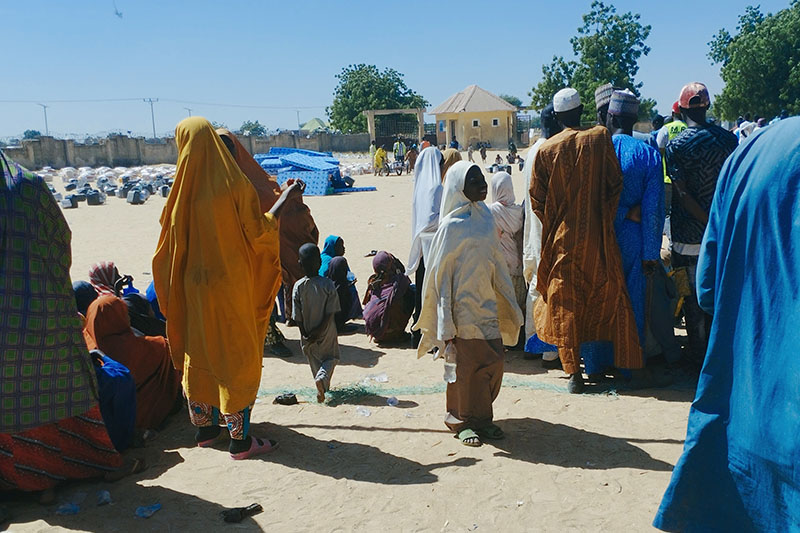Starving refugees in conflict-ridden Niger say life is unbearable because they do not have enough food and there’s no clean drinking water
More than 300,000 Nigerians – who fled from Borno State to escape attacks by insurgents and settled in Diffa in the Niger Republic – are pleading with the government to help them return to their ancestral homes.
Most of the refugees fled from Damasak, Abadam and Guzamala at the peak of the Jamā’at Ahl as-Sunnah lid-Da’way Wa’l-Jihād (JAS), better known as Boko Haram, insurgency.
However, hardships aggravated by sanctions that were imposed by the Economic Community of West African States (ECOWAS) on Niger after last year’s July 26 military coup have made life virtually unbearable for many refugees who want to leave Diffa and return to their hometowns. But many of them do not have enough money and they have called on the Nigerian government for help.
Refugees Salisu Mustapha and Babagana Bulama Ganjar told RNI that they had faced severe difficulties in Niger since the military coup.
“Our situation is bad and most refugees in Diffa want to return to their ancestral hometowns in Nigeria. Life is extremely difficult and we are suffering. We have very little to eat and most of us are starving. It’s terrible to see our wives and children go hungry,” said Mustapha.
“Before the coup, we used to receive support from the government of Niger and non-governmental organisations [NGOs]. But we have not received any assistance from either the government of Niger or Nigeria since the coup. Even the NGOs are no longer helping us. That’s why most of us want to return to our hometowns in Nigeria.”
Ganjar said that even having money did not help to get food.
“Food is not available because very few supplies have come into Niger since ECOWAS imposed sanctions on Niger. We are left alone and we don’t know what to do next. Our children are starving and they are no longer going to school.
“The Nigerian government hasn’t made any attempt to get us back home and, as far as we know, they aren’t even aware of our rapidly worsening situation. The sanctions are tough on us and we are pleading with ECOWAS to lift them.”
In the recent weeks the situation in Diffa has intensified. Many refugees told RNI that they could not endure the hardships and they wanted to return to Nigeria.
Mallam Abbati said many refugees had left Niger in the past few weeks. ECOWAS had lifted the restrictions on movement and refugees could not wait to return home.
“No one asked the refugees in Diffa to leave. We have not heard anything from the government of Niger or from security personnel. The refugees decided to leave because of the many hardships we face here. Women and children are starving; the suffering is too much. No one has helped to ease our plight.
“Every day 50 to 100 refugees leave Diffa. Most of them try to sell their belongings, such as kitchen utensils and mattresses, to try to get enough money for transport out of Niger. If this continues, there will not be one refugee left here.
“I would also like to return. I am begging the Nigerian government to help those of us who are still in Diffa. The government needs to intervene to help us get home.”
Usman Goni said refugees in Diffa were “desperate” to return home.
“We cannot bear the hardships we suffer every day. We don’t have enough food or clean drinking water. Everyone is hungry.
“In the Kara community of Diffa, there is a bus that takes refugees to the riverbank. Refugees cross the river and catch another bus to take them to Shettimari, where they catch another bus or they trek for kilometres to reach Damasak. Neither the Nigerien nor the Nigerian governments are helping refugees. There are troops of soldiers from both countries on the route but they do not do anything to help the refugees to return home.”
A report by ReliefWeb, the information service provided by the United Nations Office for the Coordination of Humanitarian Affairs (OCHA), said ECOWAS should revise sanctions to narrowly target the generals responsible for disrupting democracy.
“They [the sanctions] have created severe hardship in Niger with adverse boomerang effects on Nigeria – crippling a vibrant cross-border economy straddling the long Nigeria-Niger border, disrupting livelihoods, exacerbating humanitarian challenges, and jeopardising big rail and gas projects that could bolster regional trade. On the political front, the sanctions threaten to harm bilateral cooperation on a range of important issues, particularly security.”
It said the sanctions should be recast to focus on the direct interests of junta leaders who bear responsibility for returning the country to constitutional rule, rather than punish the populations of Niger and northern Nigeria.
“The ECOWAS sanctions have cut off Niger from many of its traditional trading partners, worsening chronic food insecurity among vulnerable groups. The junta has maintained relations with neighbours Burkina Faso, Chad and Mali, which it sees as allies because all three are under military rule.
“The junta is making life difficult for humanitarian organisations trying to deliver relief.”
Power outages were further damaging Niger’s brittle economy, it said.
“In normal times, the country imports more than two-thirds of its electricity from Nigeria, but sanctions have severely curtailed supply.”
FALMATA MOHAMMED ALI






